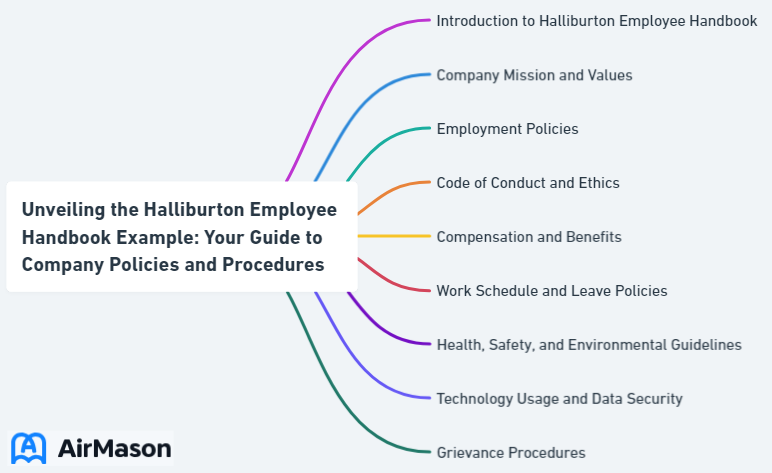
In today’s complex business landscape, understanding company policies and procedures is essential for maintaining ethical behavior and compliance with laws and regulations. Halliburton, a leading provider of products and services to the energy industry, recognizes the importance of instilling a strong ethical foundation in its employees. In this blog post, we will explore the Halliburton Employee Handbook example, which serves as a comprehensive guide to company policies and procedures, ensuring that employees maintain the highest standards of integrity in their professional conduct.
Key Takeaways
- Halliburton’s Code of Business Conduct provides direction on ethical and legal conduct for stakeholders, employees, and third parties.
- Halliburton offers a variety of resources to ensure compliance with the company’s policies, including an Ethics Helpline and employee training programs.
- Non-compliance may result in disciplinary measures or potential legal repercussions such as penalties, fines, litigation or regulatory inquiries.
Fortune 100 Company Employee Handbook
Welcome to our esteemed Fortune 100 Company Employee Handbook, a comprehensive guide designed to provide you with essential information and guidelines for a successful and fulfilling career within our organization. The Fortune 100 Company Employee Handbook outlines our commitment to fostering a positive work environment, promoting diversity and inclusion, and ensuring the well-being of our valued employees. As you embark on your journey with us, familiarize yourself with the policies and principles outlined in this handbook to ensure a smooth integration into our dynamic workplace. Your adherence to the Fortune 100 Company Employee Handbook is instrumental in maintaining the high standards that define our company culture and contribute to our collective success.
Halliburton’s Code of Business Conduct: An Overview
Halliburton’s Code of Business Conduct serves as the main channel, articulating the company’s dedication to ethical and legal conduct for its employees and stakeholders. It represents the standard of business conduct that Halliburton expects from its employees, under the supervision of the company’s chief financial officer and other executives, ensuring the business conduct Halliburton company upholds is consistently maintained.
The purpose of this code is to convey the organization’s dedication to ethical and lawful behavior among employees and stakeholders, aligning the company’s operating and financial goals with ethical and legal conduct. It also aims to:
- Solidify the Code’s credibility
- Guarantee a well-designed, executed, and enforced program to prevent and detect criminal behavior
- Promote a culture of ethical conduct and lawfulness.

Importance of Adherence
Compliance with the Code of Business Conduct is key to maintaining Halliburton’s reputation and ensuring legal obedience. Adapting to the business and cultural environment where the company operates is necessary to maintain a workplace devoid of discrimination, harassment, intimidation, and coercion, while also managing customary business expense responsibly.
Compliance with the Halliburton Code of Business Conduct offers a range of advantages, including:
- Demonstrating a dedication to conducting business in a professional, equitable, and ethical manner
- Ensuring ethical sourcing and respect for human rights in the supply chain
- Fostering a culture of compliance and ethics
Compliance with the Code helps Halliburton sustain positive international business relationships, including each international business relationship, enhancing the company’s reputation and establishing a work environment void of unethical practices.
Scope and Applicability
Halliburton’s Code of Business Conduct applies to all employees, officers, and directors of Halliburton and its subsidiaries, ensuring that each individual adheres to the code while performing his or her assigned duties. The Code also extends to contractors and suppliers, as the company collaborates with them to guarantee ethical sourcing and maintains a supplier ethics program.
Note that the Code of Business Conduct applies in all company situations, including the negotiation and execution of agreements that might affect the company’s operations and reputation. All employees, officers, and directors are expected to comply with the code, ensuring that they maintain ethical relationships with third parties, such as suppliers, contractors, and customers.
Key Policies in Halliburton’s Employee Handbook

Halliburton’s Employee Handbook outlines key policies such as conflict of interest, anti-bribery, and financial management, providing guidance on using reporting systems like the Ethics Helpline to report any violations or concerns to the appropriate and designated employee.
These policies significantly contribute to promoting a culture of ethical behavior and compliance with company standards, including adherence to such agreements.
Conflict of Interest Policy
Halliburton’s conflict of interest policy states that a conflict of interest exists when an employee’s personal interests or activities interfere or have the potential to interfere with the company’s best interests, unless otherwise approved by the Executive Committee or its designee. The policy helps employees avoid situations that may compromise their objectivity or loyalty to the company.
Examples of potential conflicts of interest may arise when an employee’s personal interests, such as a significant personal business transaction, impede their capacity to act in the best interests of the company, especially when navigating the complexities of the business and cultural environment in which the company operates. To manage or avoid conflicts of interest, employees are expected to adhere to the company’s Code of Business Conduct, especially those who exercise substantial supervisory authority. Any conflicts of interest must be approved by the Executive Committee or its designee.
Enforcing this policy allows Halliburton to:
- Ensure that its employees prioritize the company’s interests
- Avoid situations that might result in a conflict between their personal interests and professional responsibilities
- Promote a culture of ethical conduct and compliance.
Anti-Bribery and Foreign Corrupt Practices Act Compliance
Halliburton’s anti-bribery policy ensures compliance with the Foreign Corrupt Practices Act (FCPA) and other applicable laws, including foreign currency exchange controls. The company strictly prohibits bribes, kickbacks, and other payoffs and benefits to suppliers or customers, including any foreign political party official. Moreover, employees and agents are not allowed to receive such payments.
Examples of FCPA violations include:
- Improper payments to foreign government officials
- Falsification of an FCPA compliance program
- Bribery of foreign businesses, doctors, and politicians
- Falsification of books and records, which may involve agreements that violate the FCPA
Halliburton has had to enforce its anti-bribery policy in notable instances, such as the case involving Albert “Jack” Stanley, a former executive of Halliburton subsidiary KBR, who pleaded guilty to charges of bribery and violating the FCPA in 2008. This case highlights the importance of maintaining ethical relationships with such third parties as suppliers, contractors, and customers.
To confirm compliance with the FCPA, Halliburton mandates employees with relevant job functions and those working in high-risk countries to complete anti-bribery and anti-corruption training, thereby encouraging a culture of compliance and upholding the company’s reputation for ethical conduct.
Financial Management and Internal Accounting Controls
Halliburton’s financial management policy, overseen by the company’s chief financial officer, encompasses:
- Internal control over financial reporting
- Executive compensation programs emphasizing performance and shareholder value
- A policy prohibiting conflicts of interest
All of these contribute to the company’s operating and financial goals.
The principles governing Halliburton’s internal accounting controls include assessing controls, procedures, and records on a consistent basis to guarantee adherence to corporate regulations, as well as evaluating internal accounting controls to ensure their effectiveness. Keeping accurate company’s internal accounting controls is key for the company’s financial management and decision-making processes.
To ensure the accuracy of its internal accounting controls, Halliburton employs the following practices:
- Single sourcing when there is a significant advantage to do so
- Maintaining accurate books, records, and accounts
- Adhering to internal policies that manage risk and ensure accurate financial records
- Monitoring the operation of the internal control system through internal auditors
By implementing these practices, Halliburton upholds a high level of financial transparency and integrity.
Carrier Global Employee Handbook Example
In the realm of corporate guidance and policies, the Carrier Global employee handbook example sets a noteworthy standard. The Carrier Global employee handbook example is meticulously crafted to provide a comprehensive overview of the company’s values, expectations, and operational guidelines. Employees at Carrier Global find this handbook to be an indispensable resource, offering insights into professional conduct, benefits, and the overall organizational culture. By adhering to the Carrier Global employee handbook example, individuals within the company ensure a harmonious and productive work environment, fostering a culture of mutual respect and success.
Reporting Violations and Seeking Guidance

Halliburton provides multiple channels for employees to report violations or seek guidance on ethical concerns, such as the Ethics Helpline, mail, and telephone options. These reporting options provide employees a platform to express their concerns and guarantee timely resolution of any potential issues, fostering a culture of accountability and transparency.
Ethics Helpline
The Ethics Helpline is a 24/7 resource for employees to report violations or seek guidance anonymously. Operated by an independent company, the helpline is staffed by trained personnel who can answer inquiries, provide guidance, and take reports of potential misconduct. Halliburton has implemented measures to ensure anonymity and confidentiality for those who use the Ethics Helpline, such as allowing individuals to remain anonymous when reporting violations and providing translators to ensure effective communication.
Upon receiving a report via the Ethics Helpline, the company will initiate an investigation to ascertain the facts of the situation. This process may involve collecting evidence, interviewing individuals involved, and examining company policies and procedures. Halliburton is dedicated to protecting the confidentiality of all parties involved and taking the necessary steps based on the findings of the investigation.
Other Reporting Options

In addition to the Ethics Helpline, Halliburton offers mail and telephone options for reporting violations or seeking guidance. These channels provide employees with alternative means of voicing their concerns and ensuring that any potential issues are addressed in a timely manner.
When reporting a concern via mail or telephone, it is important to provide as much detail as possible. Please include the following information:
- Your name and contact information
- Date and time of the incident or concern
- Location of the incident or concern
- Description of the incident or concern
- Any supporting evidence or documentation, if available
Halliburton upholds a policy of non-discrimination and preserves privilege over internal reports and employee interviews to ensure confidentiality when reporting concerns via mail or telephone.
Offering various reporting options, including such reporting system, demonstrates Halliburton’s commitment to promoting a culture of accountability and transparency, enabling employees to raise concerns about potential violations of the Code of Business Conduct and seek guidance on ethical matters.
Training and Compliance Monitoring

Halliburton offers training programs and conducts compliance monitoring to ensure adherence to its Code of Business Conduct. These initiatives assist employees in staying updated about company policies and procedures, fostering a culture of ethical behavior and lawfulness.
Employee Training Programs
Employee training programs at Halliburton cover various topics related to ethics and compliance, such as:
- Emotional intelligence
- Presentation anxiety
- Back-to-school tips for parents
- Stress and workplace exercise
- Stress management
- Talent identification and succession management
- Diversity and inclusion
- Human rights
- Local communities
- Customer-specific certification
- Professional development
Halliburton’s employee training program includes:
- A wide range of educational programs
- Virtual and in-person training methods
- Mentorship program
- Internship opportunities
These initiatives are designed to cater to diverse learning needs and develop future employees who are well-equipped to navigate the complexities of the business environment and uphold the company’s ethical standards.
The objectives of Halliburton’s employee training programs are:
- To ensure relevant training and development is provided in line with business needs
- To ensure learning objectives are achieved
- To invest in employees to foster innovation and achievement
- To implement clearer guidelines for an impartial and equitable assessment process.
Compliance Monitoring and Audits
Compliance monitoring and audits help identify potential issues and ensure adherence to company policies and procedures. Unfortunately, the specific steps involved in Halliburton’s compliance monitoring process are not publicly disclosed. However, it is known that the company carries out compliance audits on an annual basis.
These audits play a significant role in preserving the integrity of Halliburton’s operations, as they assist in detecting potential violations of the Code of Business Conduct, evaluating internal accounting controls, and maintaining regulatory compliance. By conducting regular audits, Halliburton can address any issues that may arise and take appropriate corrective action to ensure the continued ethical conduct of its employees.
In addition to compliance monitoring and audits, Halliburton also fosters a culture of open communication and transparency, allowing employees to voice any concerns or report potential violations through various channels, such as the Ethics Helpline, mail, and telephone options.
Consequences of Non-Compliance

Non-compliance with Halliburton’s Code of Business Conduct can lead to disciplinary measures and legal consequences. Employees must comply with the code to uphold ethical behavior, circumvent potential legal issues, and protect the company’s reputation.
Disciplinary Measures
Disciplinary measures may include warnings, suspension, or termination of employment. The specific disciplinary measures taken may vary depending on the nature and severity of the non-compliance. For instance, an employee may receive a warning for a minor infraction, while more severe cases could result in suspension or termination of employment.
Employees should be aware of the potential consequences of non-compliance with the Code of Business Conduct. Understanding the possible disciplinary measures equips employees to uphold ethical behavior and avoid issues that could arise from non-compliance.
Legal Implications
Failure to comply with Halliburton’s Code of Business Conduct can lead to legal ramifications, such as penalties, fines, litigation, and harm to the company’s reputation. Legal consequences may also include regulatory inquiries, financial penalties, and damage to the company’s reputation.
In the past, Halliburton employees have encountered legal repercussions arising from non-compliance in various areas, such as:
- Violation of the Foreign Corrupt Practices Act (FCPA)
- Failure to meet local content requirements
- Employment law violations
- Misclassification of employees
By adhering to the Code of Business Conduct, employees can minimize the risk of legal consequences and help maintain the company’s reputation for ethical conduct and compliance with the law.
Delek US Holdings Employee Handbook Example
In the Delek US Holdings employee handbook example, our comprehensive guide provides employees with essential information about company policies, procedures, and expectations. The Delek US Holdings employee handbook example serves as a valuable resource, offering insights into our organizational culture, benefits, and code of conduct. This document reflects our commitment to fostering a positive and inclusive work environment. Employees can refer to the Delek US Holdings employee handbook example to gain clarity on their rights, responsibilities, and the shared values that contribute to our collective success.
Summary
In conclusion, Halliburton’s Employee Handbook serves as a comprehensive guide to company policies and procedures, ensuring that employees maintain the highest standards of integrity in their professional conduct. By understanding the key policies outlined in the handbook, such as conflict of interest, anti-bribery, and financial management, employees can better navigate the complexities of the business environment and uphold ethical behavior.
As a leading provider of products and services to the energy industry, Halliburton recognizes the importance of instilling a strong ethical foundation in its employees. Through training programs, compliance monitoring, and various reporting channels, the company fosters a culture of ethical conduct and compliance with the law. By adhering to Halliburton’s Code of Business Conduct, employees can contribute to the company’s success and uphold its reputation for excellence in the industry.
Frequently Asked Questions
What benefits do Halliburton employees get?
Halliburton employees receive comprehensive medical, dental and vision insurance as well as basic life, short-term disability and long-term disability coverage. Additionally, they have access to an Employee Assistance Plan and accounts to save for large health expenses.
How many people does Halliburton employee?
Halliburton, a 104-year-old energy company founded in 1919, employs around 55,000 people worldwide. It boasts 16.5% female and 44.7% ethnic minorities among its employees.
What is the Halliburton supplier code of conduct?
Halliburton suppliers must promote a culture of respect, uphold key human rights, and provide safe working conditions, reasonable hours, and fair compensation.
What is the purpose of Halliburton’s Code of Business Conduct?
The purpose of Halliburton’s Code of Business Conduct is to ensure ethical and lawful behavior among employees and stakeholders, under the guidance of the company’s executive leadership.
To whom does the Code of Business Conduct apply?
The Code of Business Conduct applies to all Halliburton employees, officers, directors, contractors, and suppliers.
Important Disclaimer:
The article presented here does not serve as a representation of the company’s actual employee handbook mentioned in this article.
Our discussions and insights regarding employee handbook are based on assumptions about what may be considered significant in this companies’ policies. These assumptions are drawn from available information and industry knowledge. Readers are advised that the content provided is for informational purposes only and should not be construed as an exact reflection of any company’s official policies or procedures. For precise and accurate details regarding a company’s employee handbook, individuals should refer directly to the company’s official documentation or consult with appropriate representatives.
Please be aware that the content on this page has been generated by using artificial intelligence language models and may contain errors, inconsistencies, or outdated information. It is provided as-is without any warranties or guarantees of accuracy. We strongly recommend using this content as a starting point for further research. We disclaim any liability for damages or losses resulting from the use or reliance on this content.